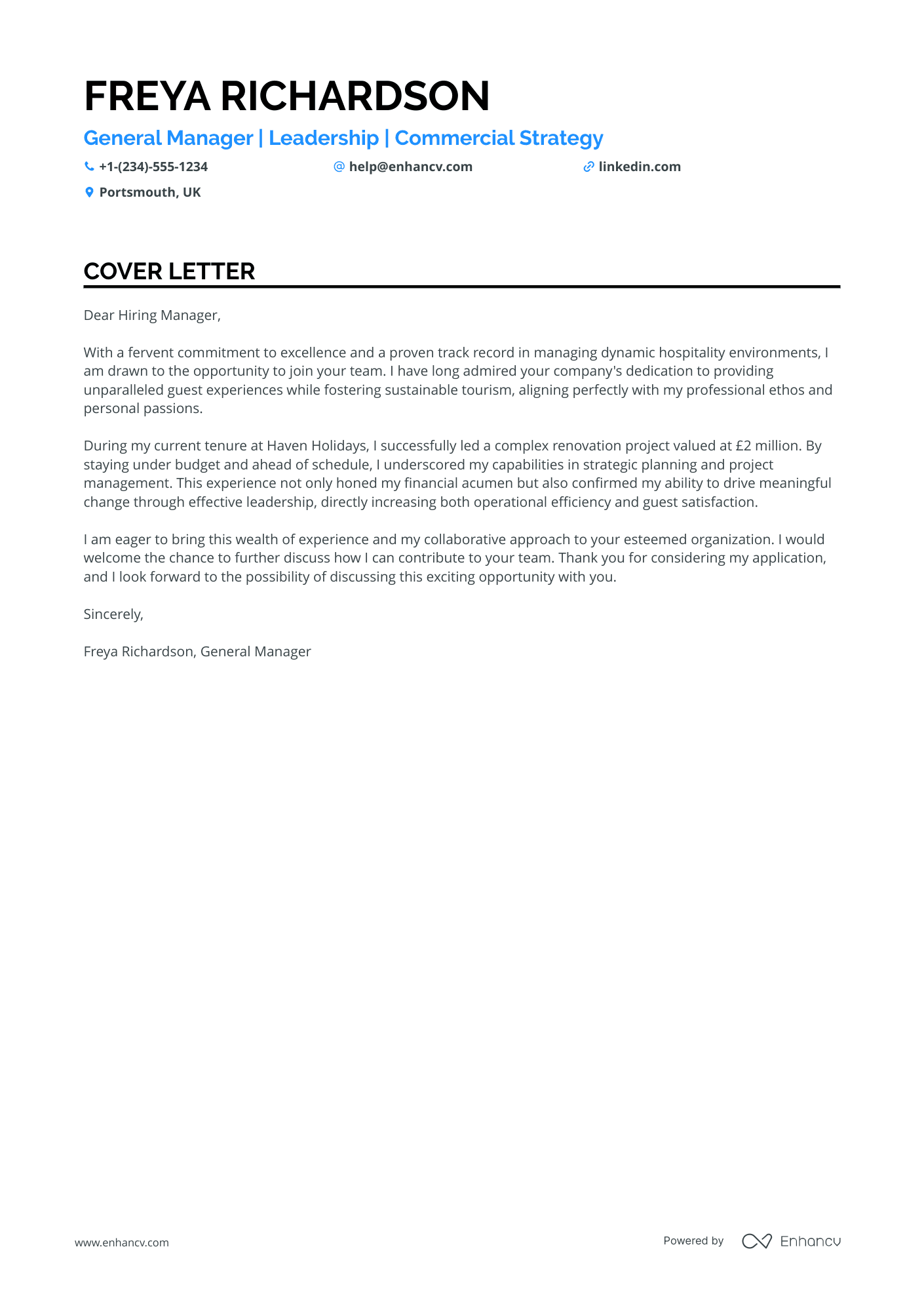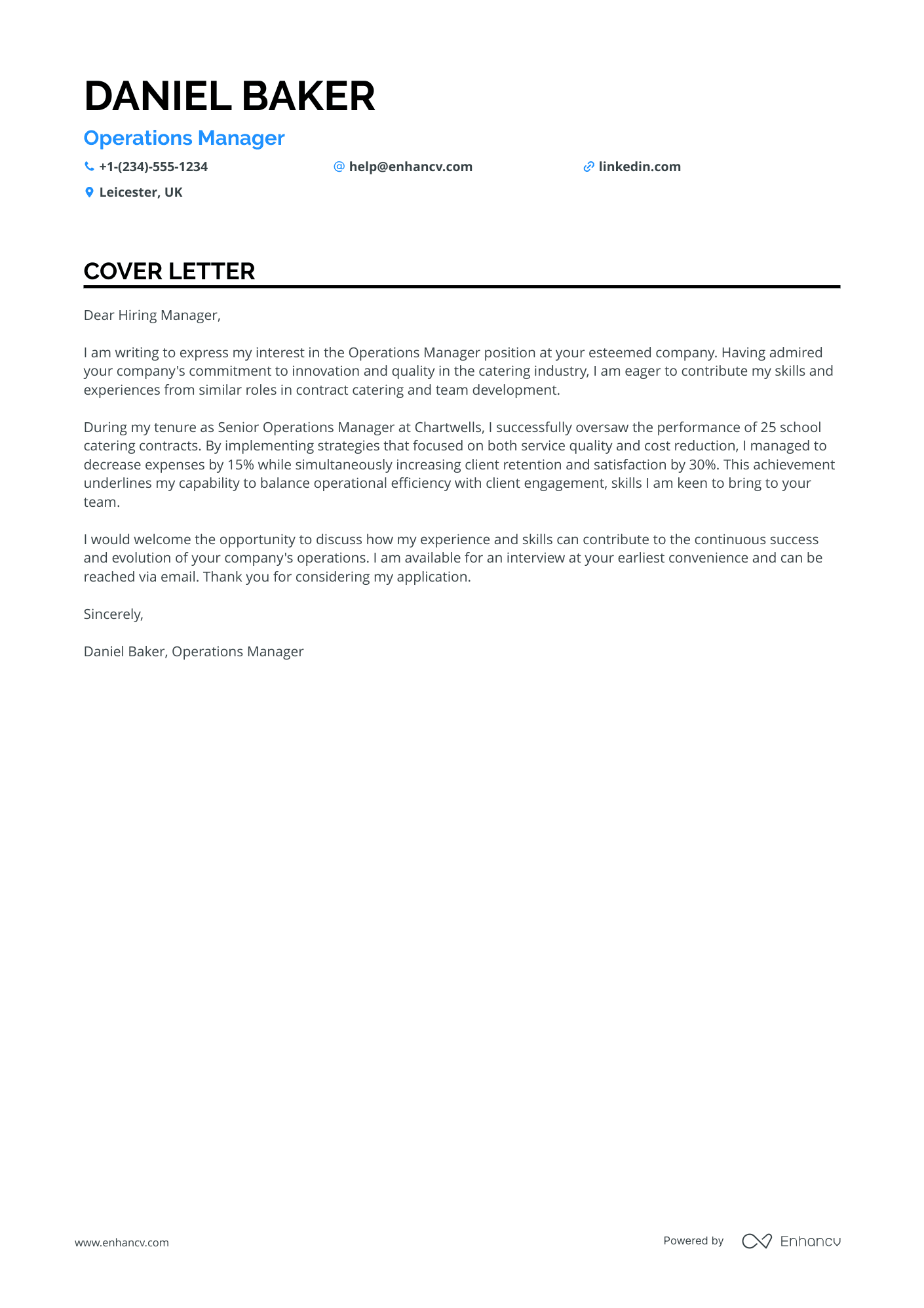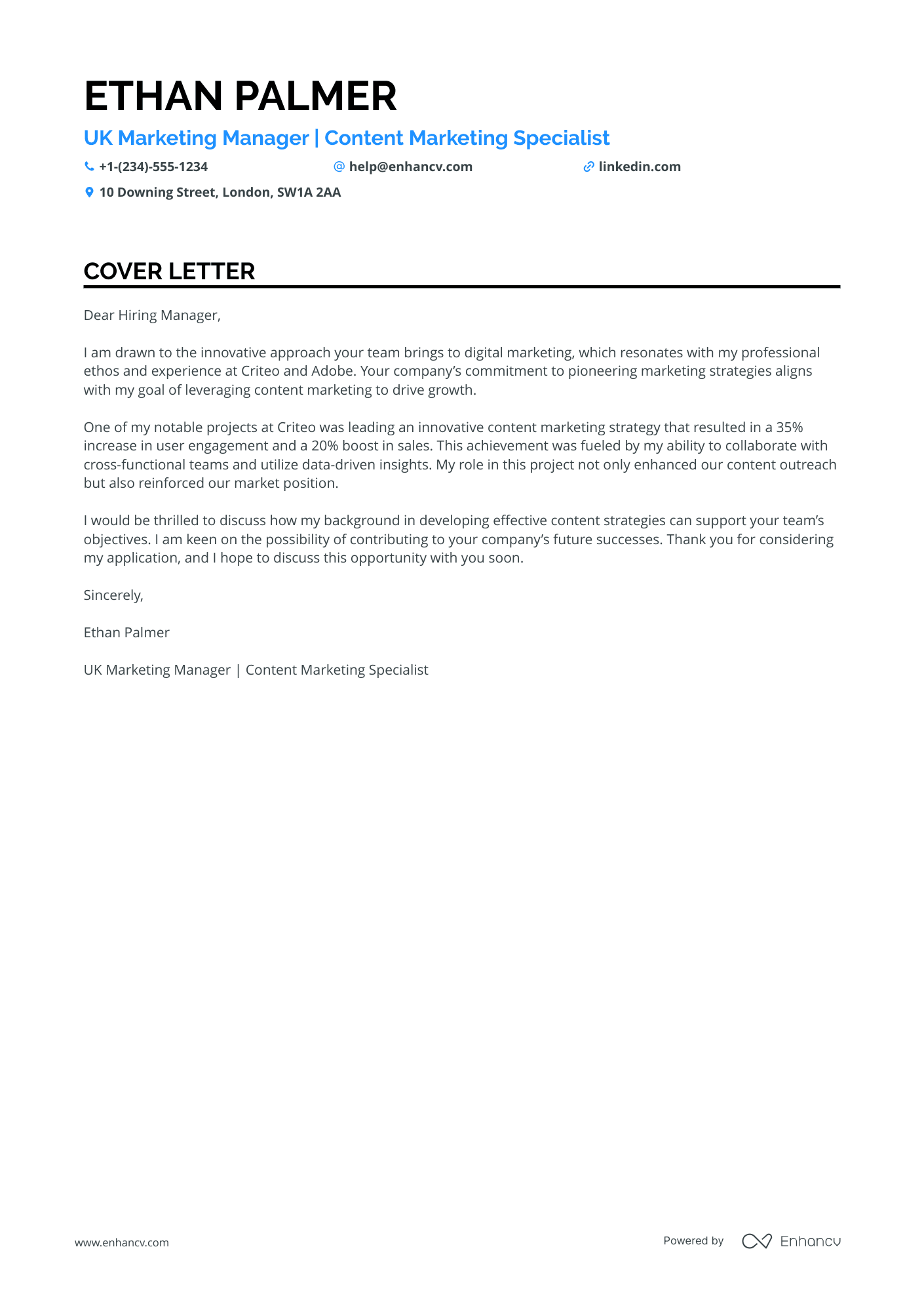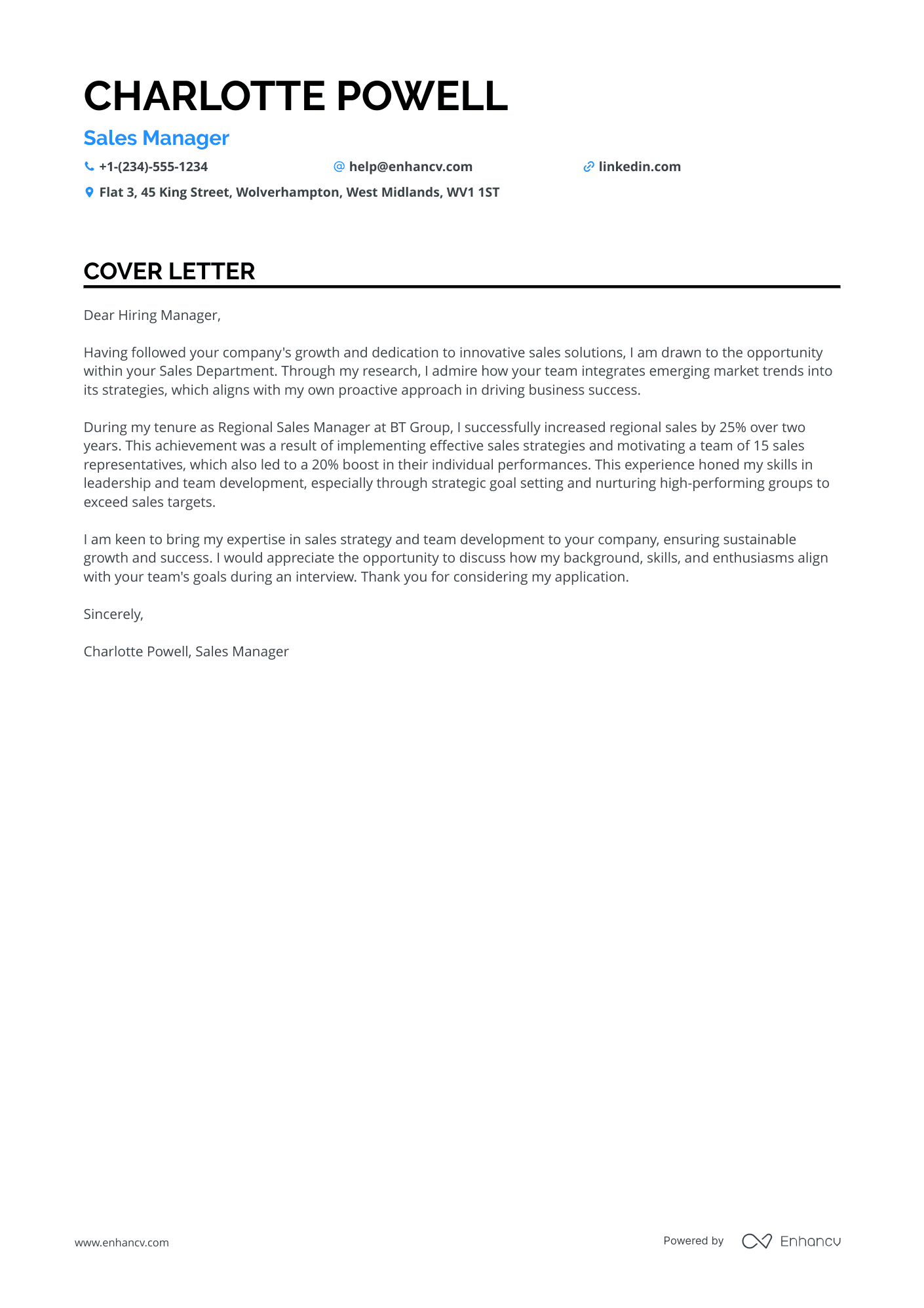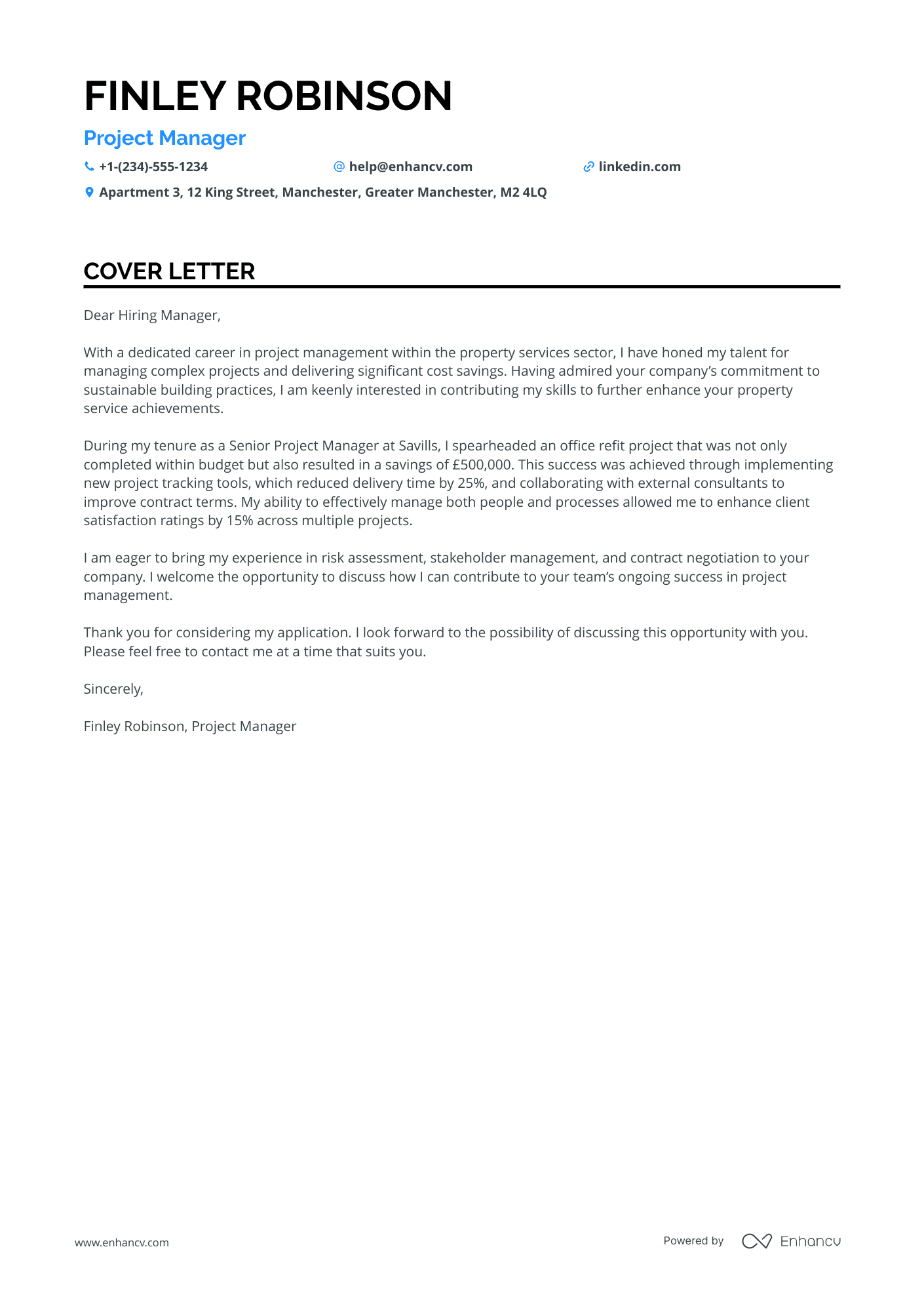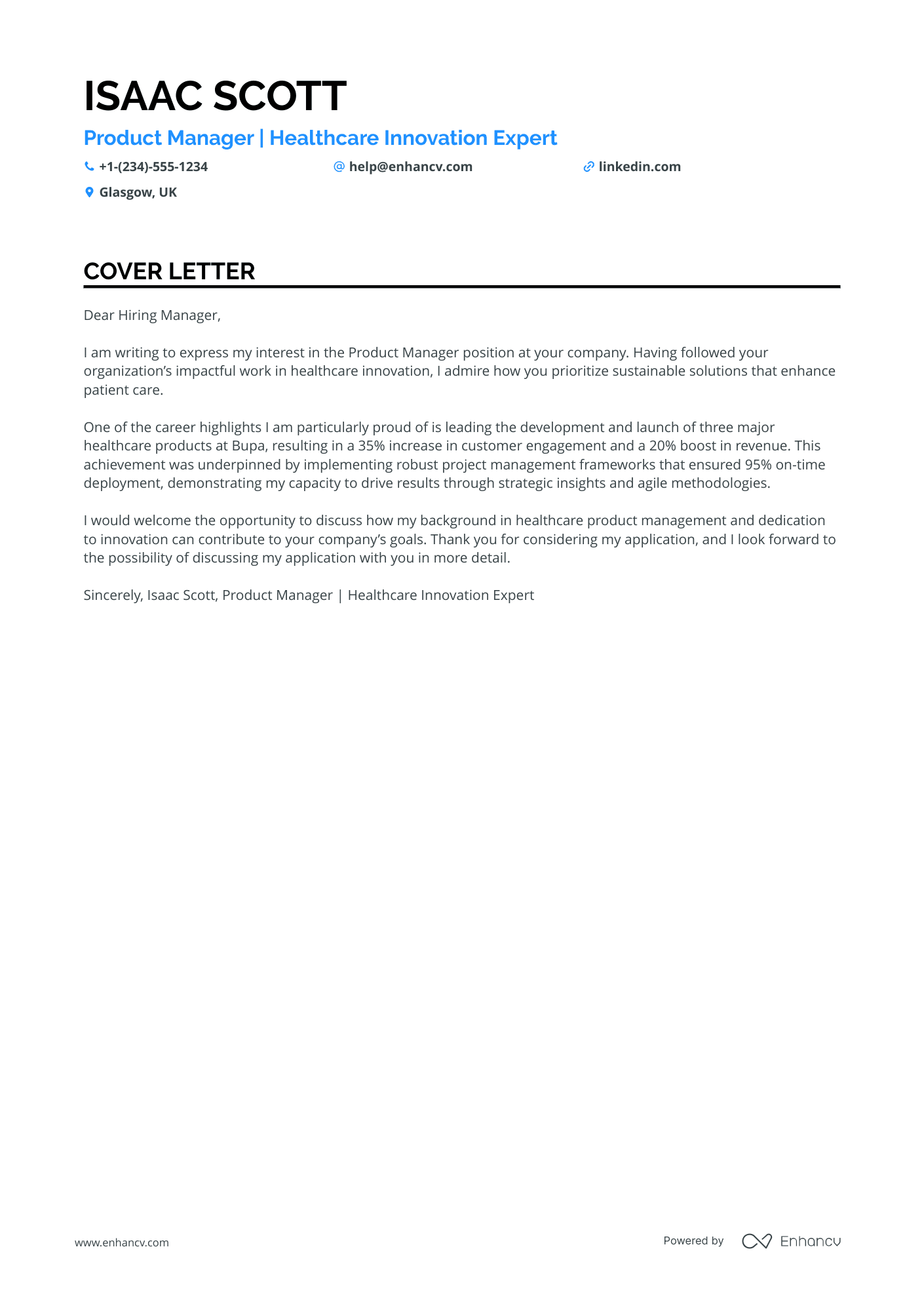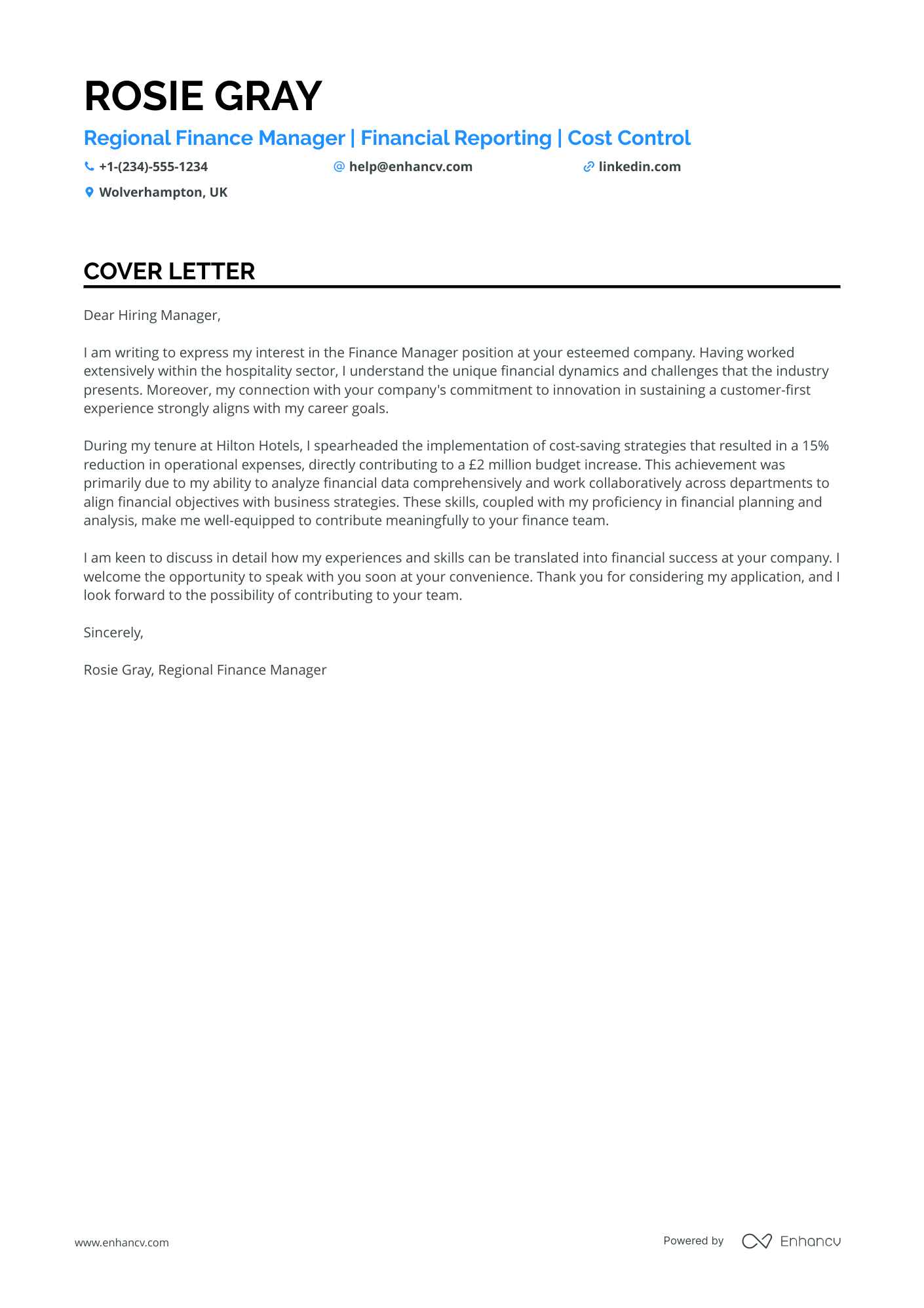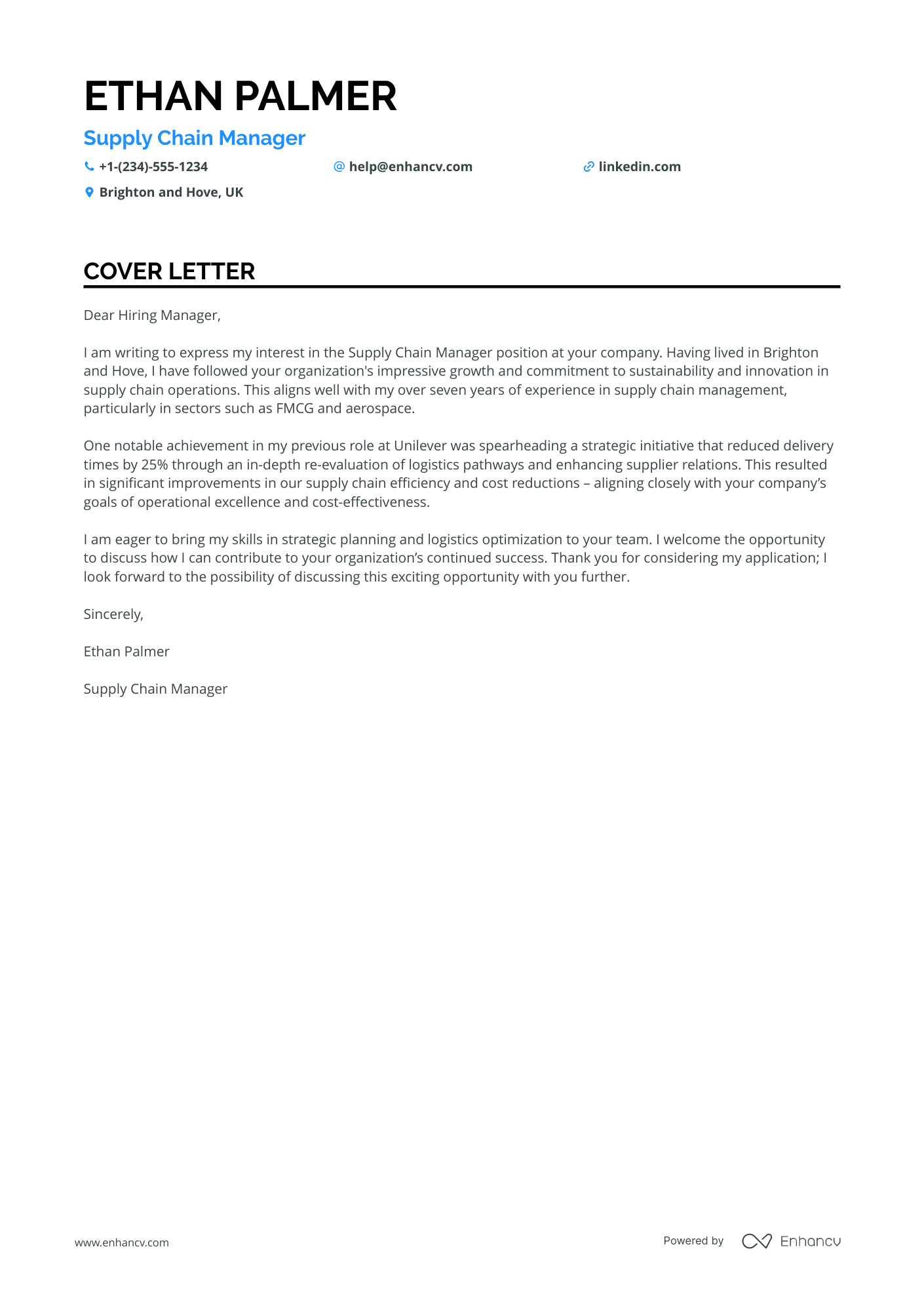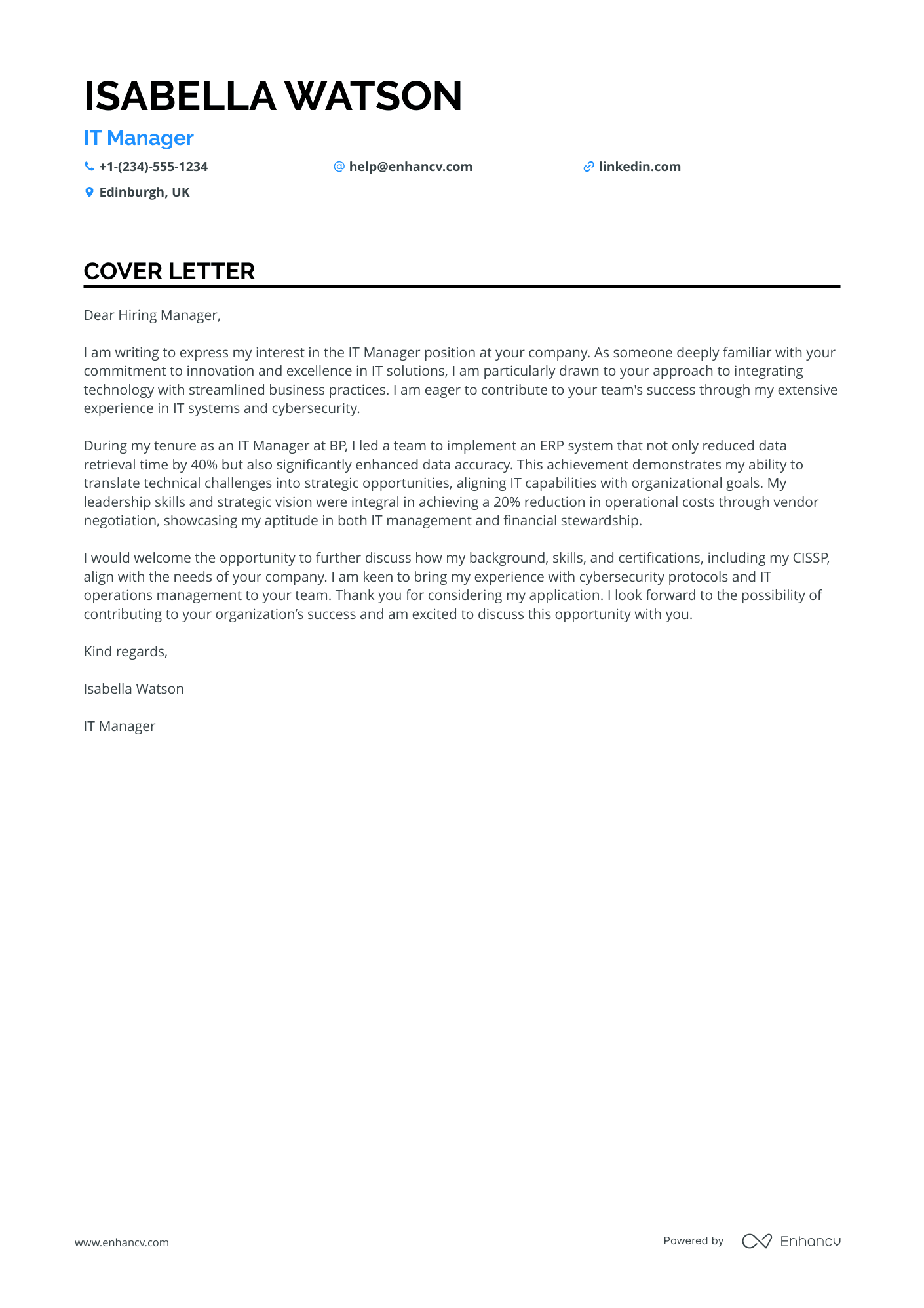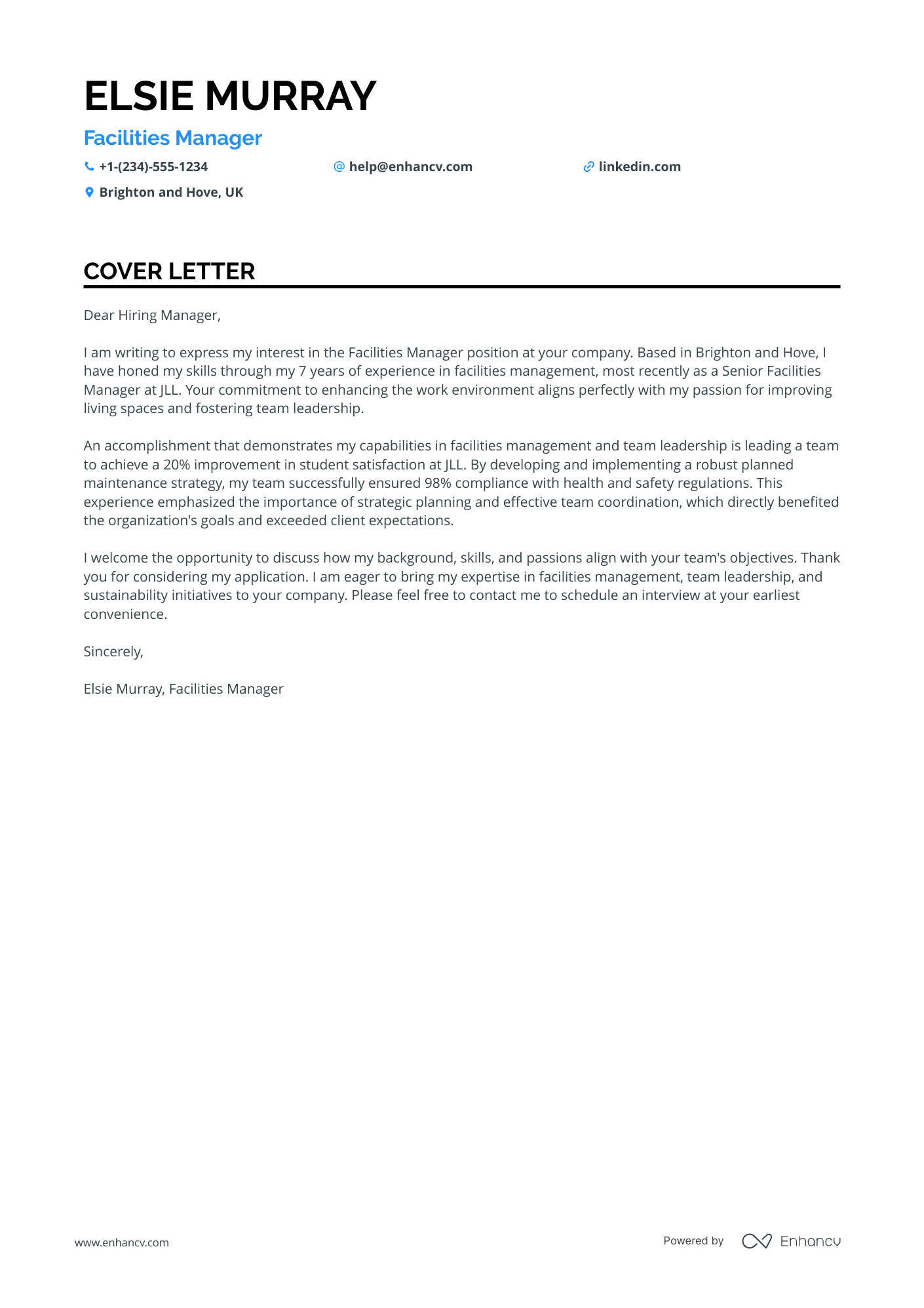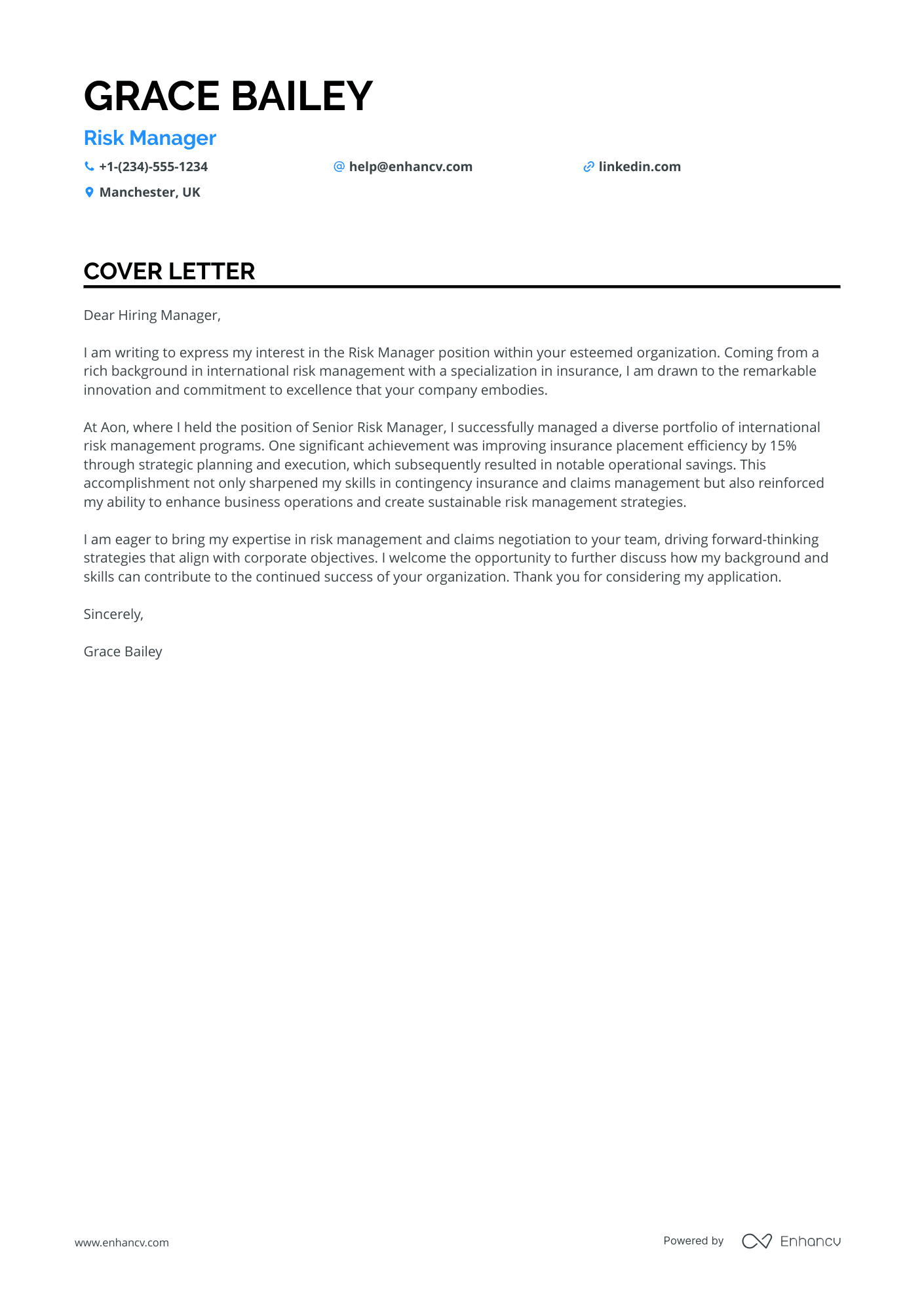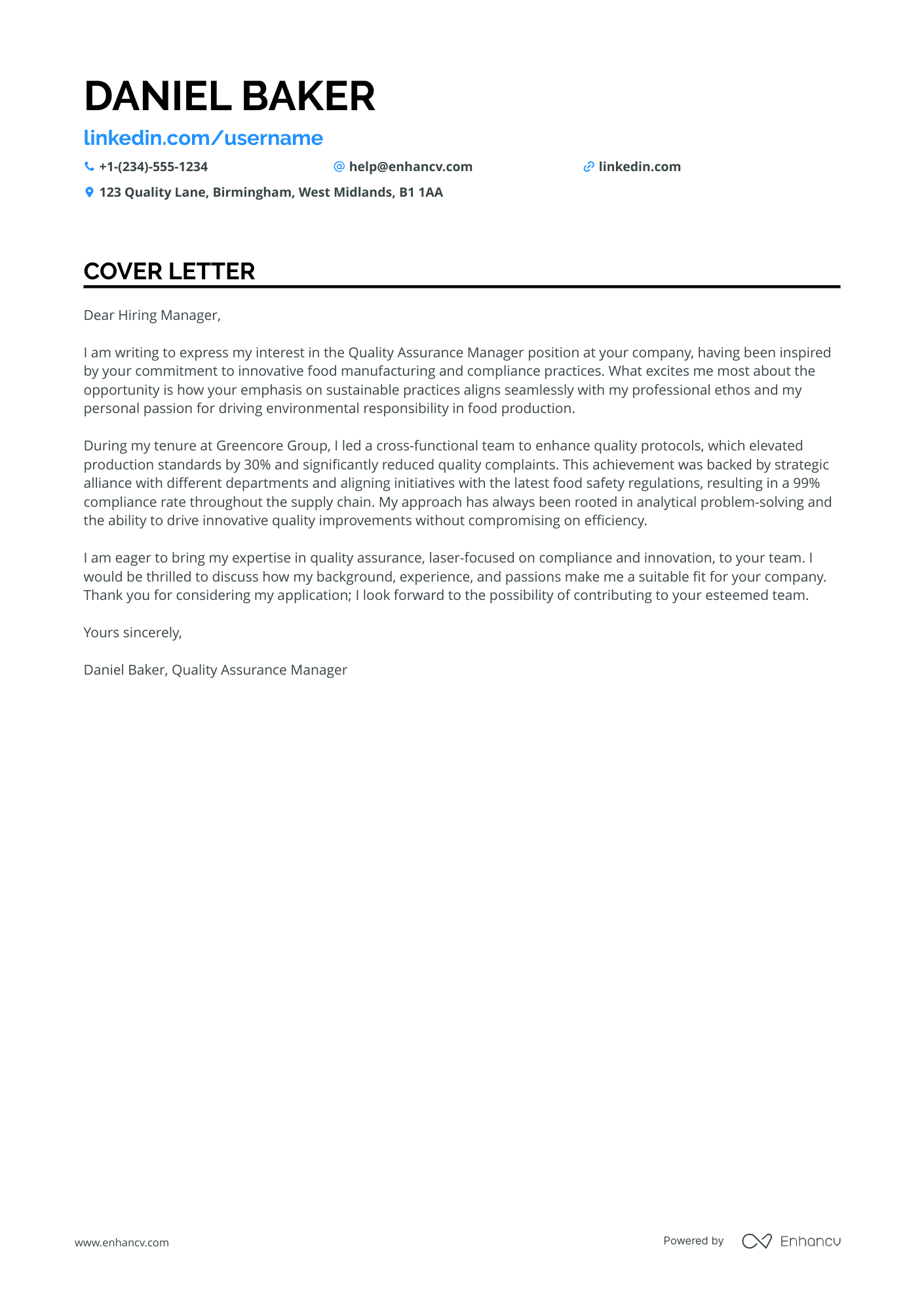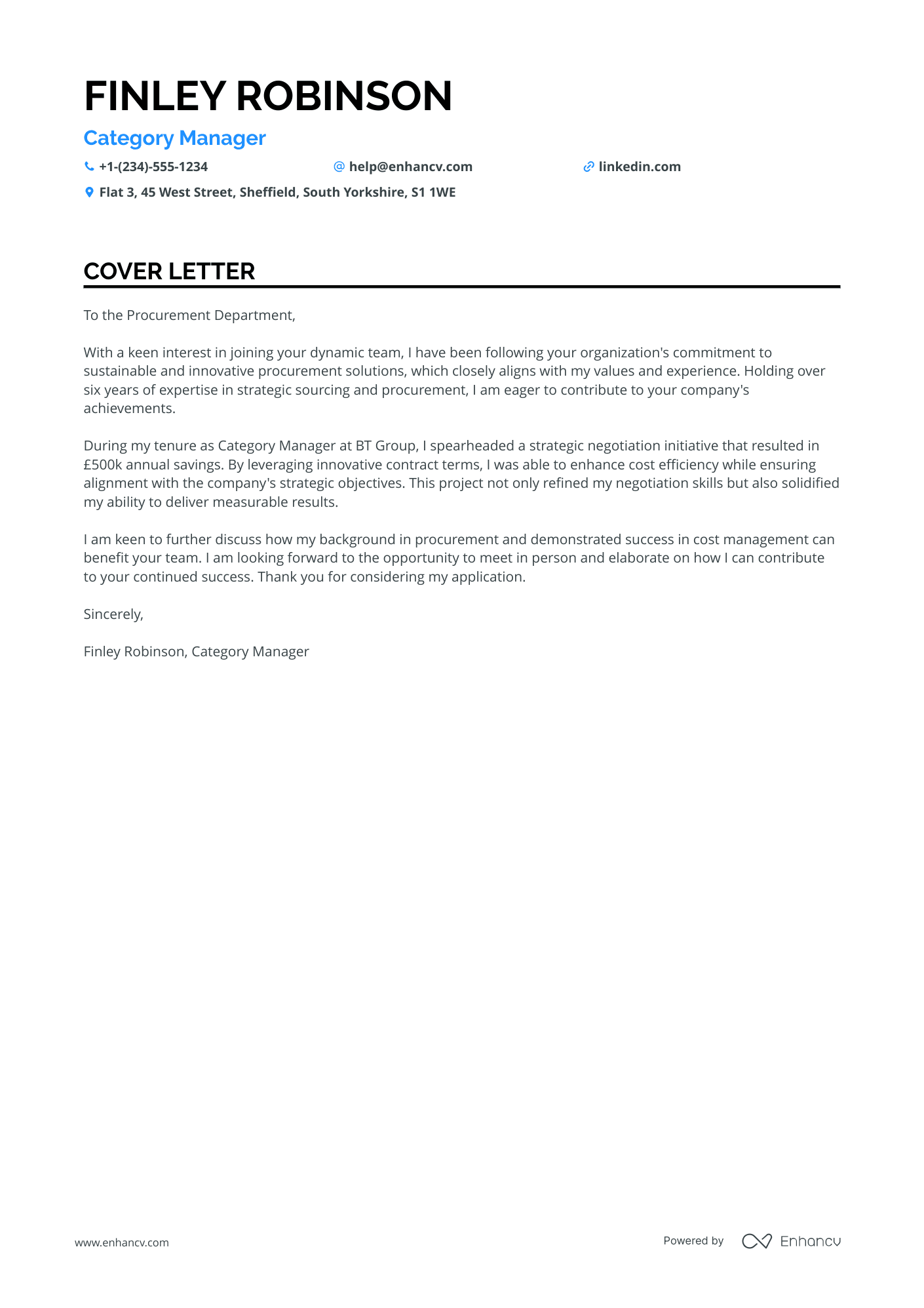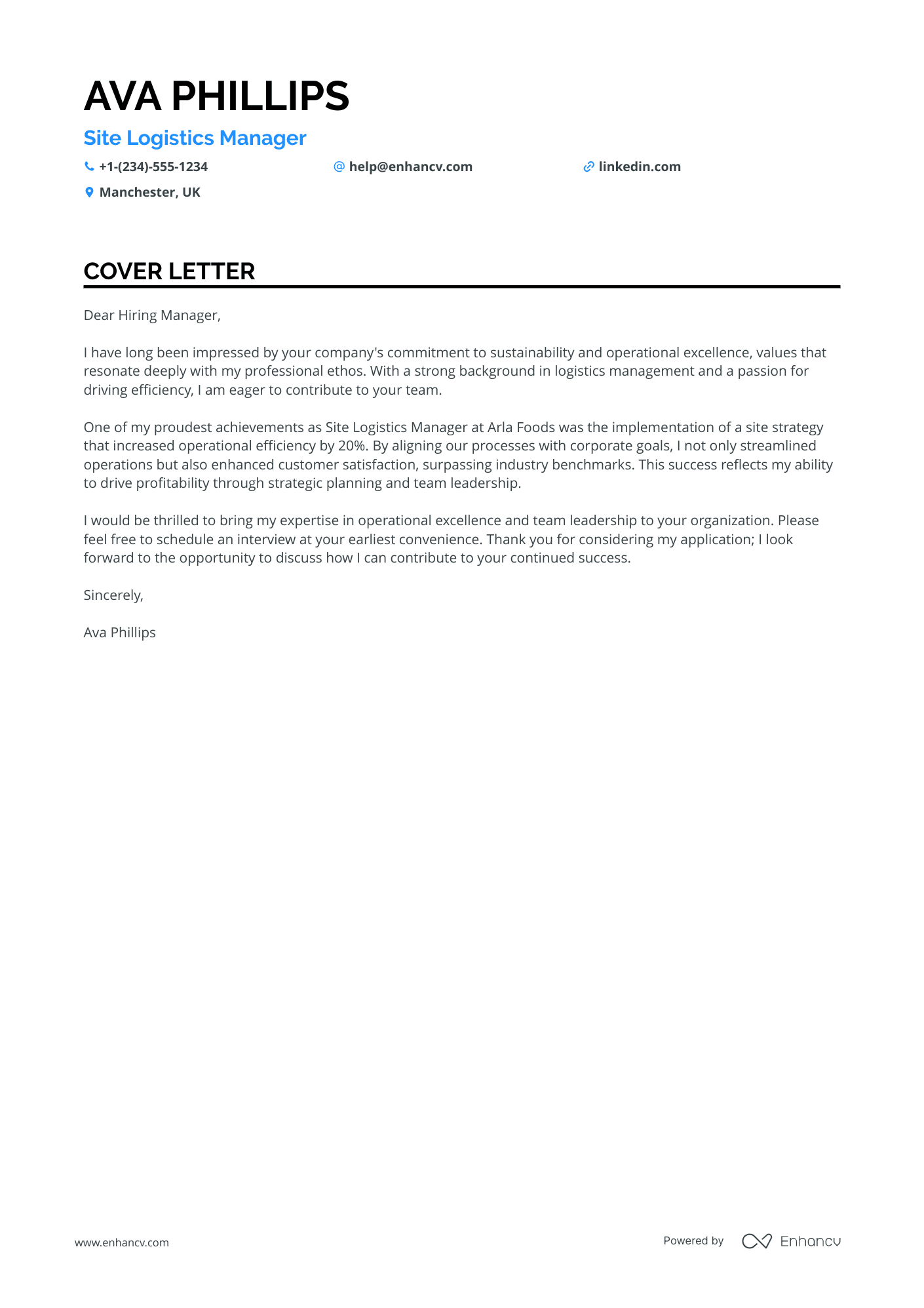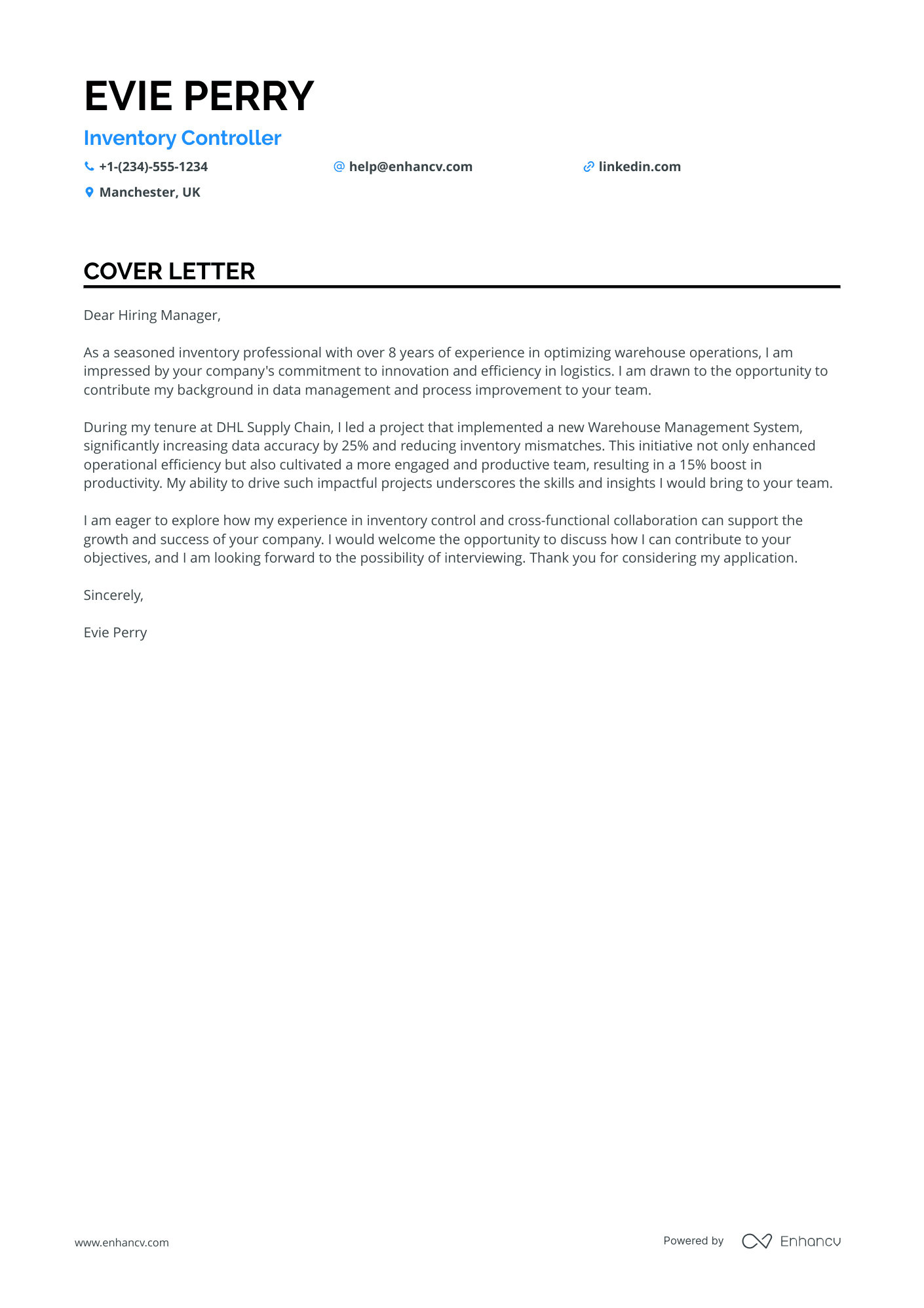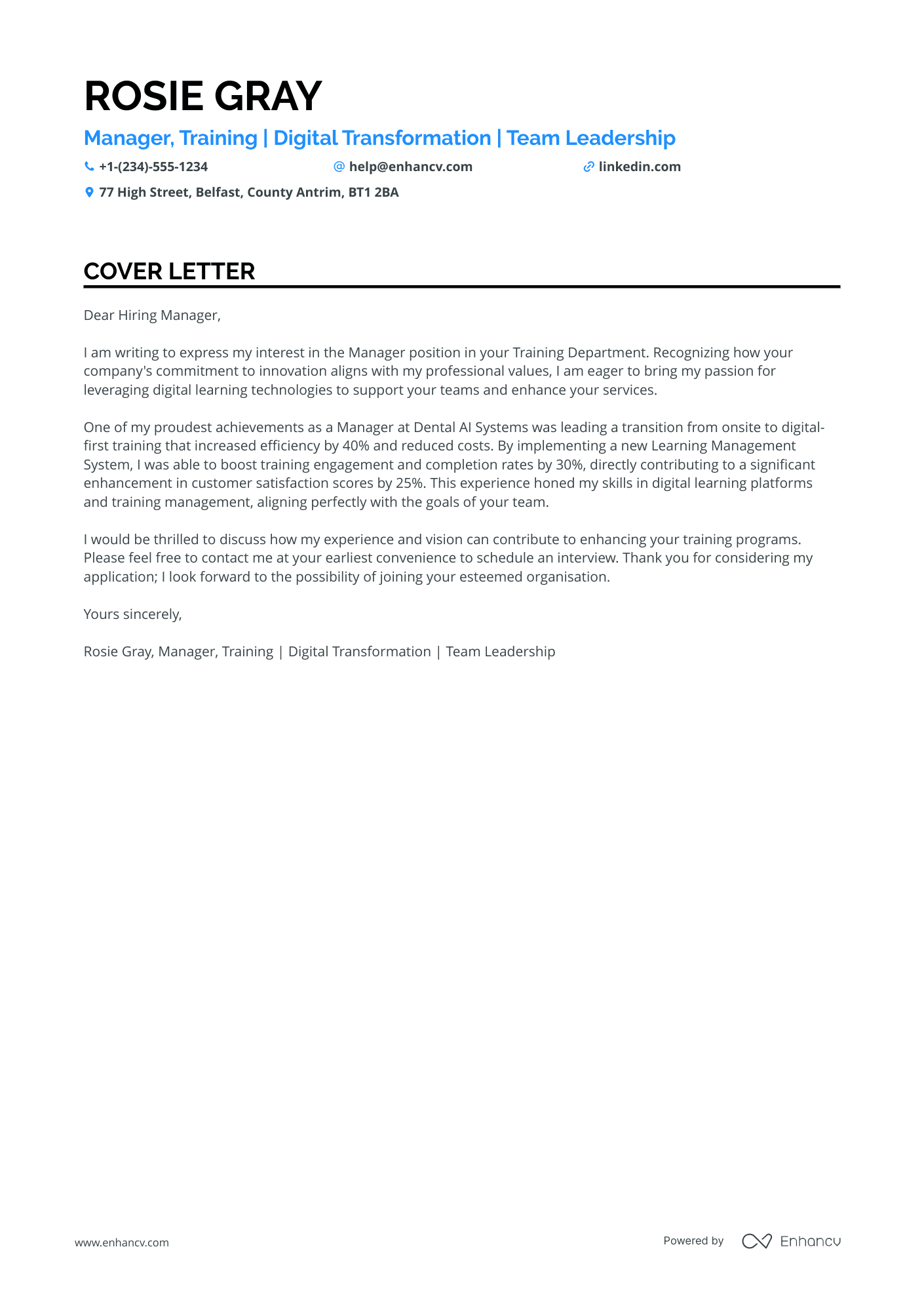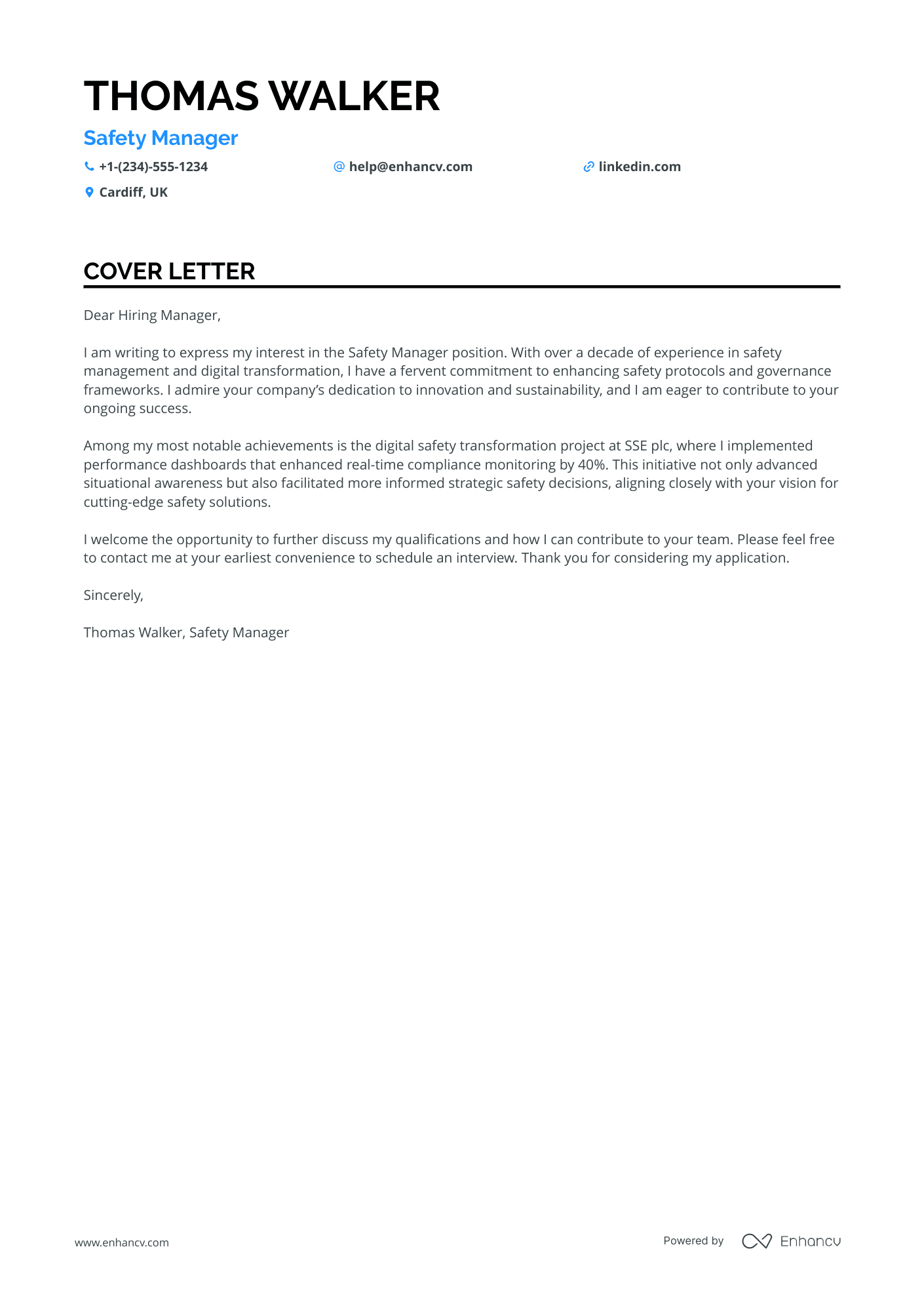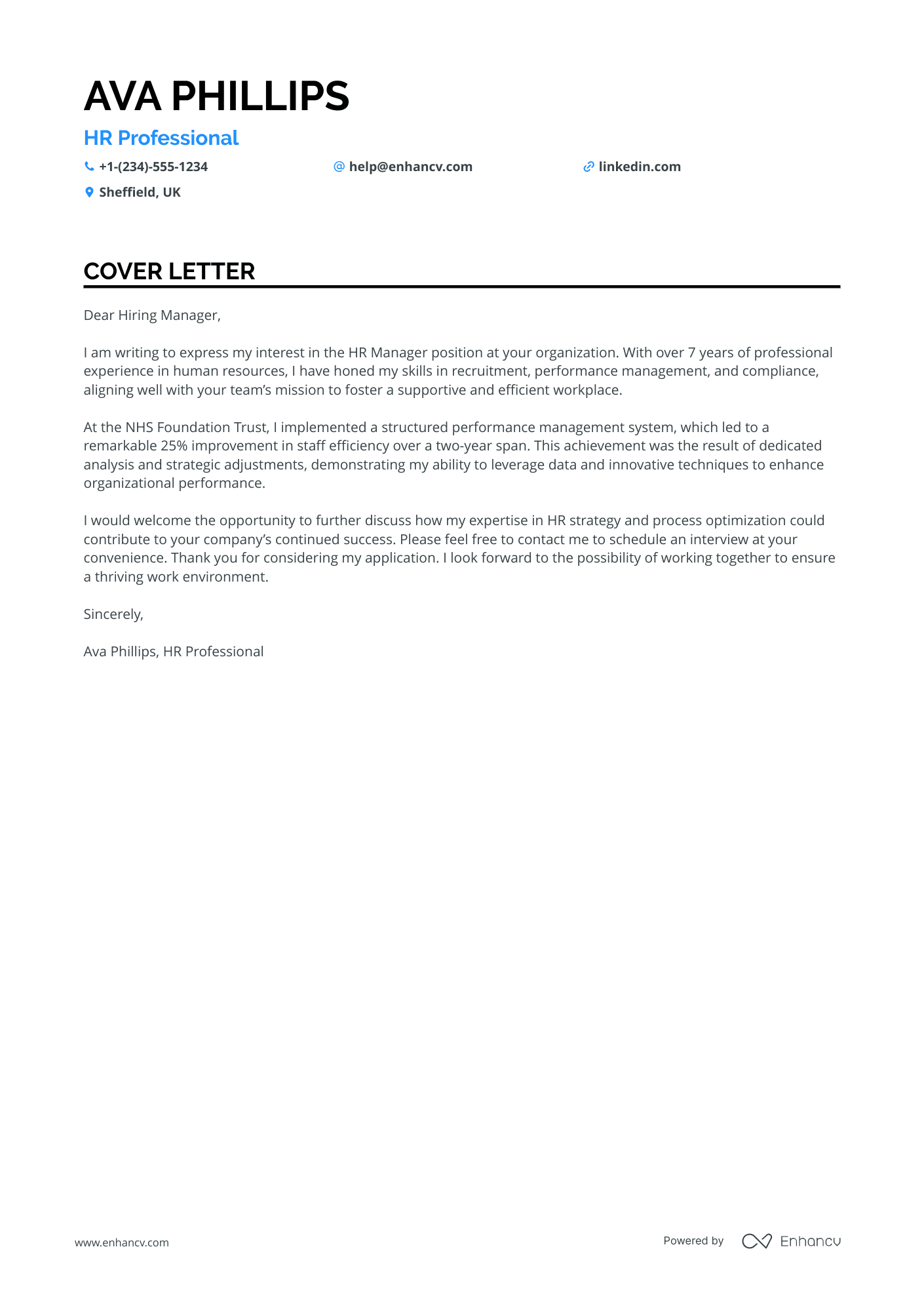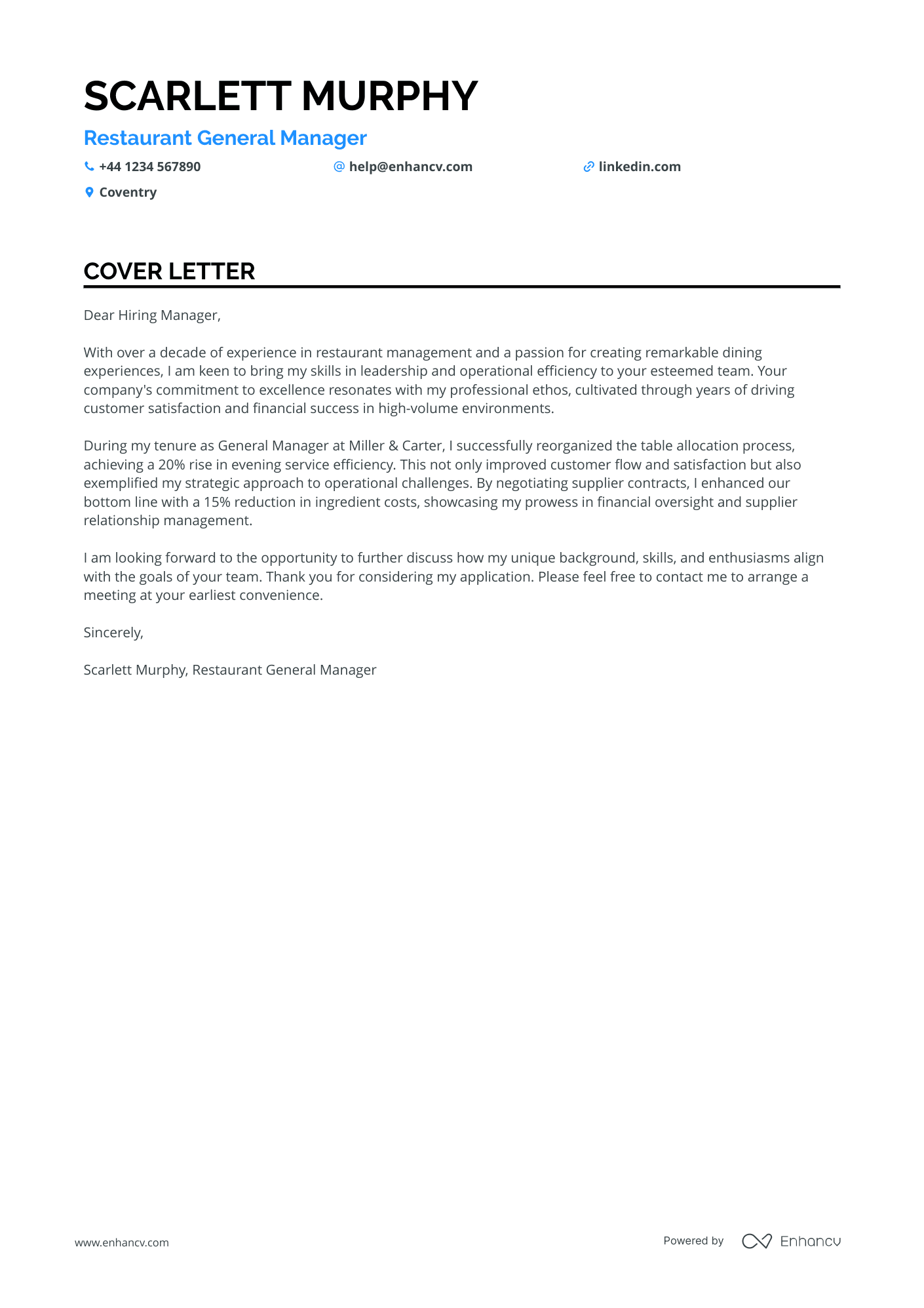Writing a strong cover letter requires close attention to detail, from the tone of voice to avoiding those pesky spelling or grammar mistakes.
Overlooking similar small details can weaken your application.
Many candidates also struggle with how to address the letter, often opting for 'Dear Sir or Madam' when they can’t find the correct contact. This can make your cover letter feel impersonal.
In this guide, we’ll show you how to perfect these crucial elements, ensuring your cover letter is polished and professional without relying on clichés.
Cover letter examples for manager
By Role
General Manager
- Tangible Achievements: The cover letter quantifies achievements with specific statistics, such as a 33% increase in sales growth and a 25% reduction in energy costs, which effectively demonstrates the candidate's impact in previous roles.
- Relevant Experience: It highlights extensive experience in managerial roles within the hospitality industry, showcasing skills in leadership, strategy, and operational excellence—all crucial for a general manager position.
- Educational Background: The mention of a Master of Business Administration (MBA) provides a strong academic foundation for leadership and strategic roles, reinforcing the candidate's qualifications.
- Specialised Training: Courses such as "Advanced Leadership Certification" and "Sustainable Tourism Practices" are highlighted to address skills relevant to the role, adding depth to the candidate's expertise.
Operations Manager
- Quantified Achievements: The cover letter effectively uses quantitative data (e.g., "boosting client satisfaction by 30%") to demonstrate the impact of past actions, showcasing the candidate's ability to deliver measurable results.
- Relevant Certifications: Highlighting certifications such as the "Advanced Food Safety Certification" demonstrates a commitment to maintaining high standards in a specialised industry, which is crucial for an operations role in catering.
- Leadership and Team Development: Emphasising experiences in leading large teams and improving engagement levels by 40% suggests strong leadership skills, a critical aspect of the Operations Manager role.
- Client Relationship Management: The inclusion of client relationship achievements, such as a 30% increase in client retention, underlines the candidate's capability to maintain and enhance important business relationships.
Marketing Manager
- Highlight Relevant Experience: Emphasise roles and achievements that directly relate to the position, such as the role of Marketing Manager at Criteo, where innovative content strategies led to significant user engagement and sales increases.
- Showcase Specific Certifications: Mention certifications like the "Google Analytics Certification" for roles involving data analysis, enhancing credibility in strategic decision-making.
- Focus on Quantifiable Achievements: Integrate specific metrics, such as the 50% brand visibility increase and 40% market share growth, to demonstrate proven impact and success in previous roles.
- Include Relevant Skills: Prioritise skills pertinent to the role—for instance, "Content Marketing" and "Digital Strategy"—to align personal capabilities with job requirements.
Sales Manager
- Highlighting Proven Achievements: The cover letter effectively underscores significant accomplishments, such as increasing regional sales by 25% and achieving a consistent annual revenue growth of 22%, showcasing Oliver's capability in driving sales success.
- Emphasising Leadership Skills: By detailing experiences in leading and developing sales teams, the cover letter demonstrates Oliver's strong leadership abilities, critical for a Regional Sales Manager role.
- Showcasing Market Analysis Expertise: Mentioning initiatives like leading market analysis and identifying key business opportunities illustrates the candidate's strategic approach to market challenges.
- Incorporating Continuous Learning: The inclusion of courses such as "Advanced Sales Management" from London Business School highlights Oliver's commitment to personal development and staying updated with top-tier management strategies.
Project Manager
- Emphasising the Prince2 certification, which is critical for demonstrating expertise in recognised project management methodologies and can significantly enhance job competitiveness in project management roles.
- Highlighting specific achievements, such as successfully saving £2M in project costs through effective time and cost management, proving a strong track record in delivering considerable financial benefits.
- Focusing on risk assessment and mitigation strategies, which are crucial skills for a project manager to ensure project success by managing uncertainties and maintaining safety standards.
- Showcasing experience with cost estimation and contract negotiation, key proficiencies for managing and delivering projects under budget, thereby ensuring financial efficiency and resource optimisation.
Product Manager
- Highlighting specialised certifications, such as the "Healthcare Data Analysis" from FutureLearn, showcases a commitment to using data effectively to drive product strategies in healthcare.
- Emphasising successful outcomes, like the 35% increase in market engagement, provides tangible proof of impact and expertise in product launches.
- Focusing on cross-functional collaboration and agile methodologies demonstrates the ability to navigate and optimise complex product development environments.
- Incorporating specific metrics, such as a 20% rise in revenue and 18% improvement in customer satisfaction scores, underscores the candidate’s data-driven approach and success in delivering results.
Finance Manager
- Highlighting Certifications: Mentioning the 'Certified Management Accountant (CMA)' certification emphasises specialised knowledge crucial for a finance manager role.
- Emphasising Quantifiable Achievements: Including specific metrics like '15% reduction in operational expenses' and '20% increase in financial forecast accuracy' showcases the candidate's impact and effectiveness in similar roles.
- Demonstrating Leadership and Mentorship: Noting experiences like 'mentored and developed finance team members' underscores the candidate's ability to lead and improve team performance, important qualities for a managerial position.
- Industry-Relevant Passion: Expressing a passion for 'Hospitality Innovation' aligns with the candidate's career in the hospitality industry, demonstrating both personal interest and professional commitment.
Supply Chain Manager
- Targeted Expertise: The applicant clearly emphasises their expertise in supply chain management within the FMCG and aerospace industries, which adds significant value by showcasing specialised knowledge in these sectors.
- Quantifiable Achievements: The letter effectively quantifies past accomplishments, such as reducing delivery times by 25% and cutting operational costs by 18%, providing tangible evidence of the applicant's ability to deliver impactful results.
- Leadership and Collaboration: There is a strong focus on cross-functional team leadership and collaboration, which are crucial skills for a supply chain management role that often requires coordinating with various departments and external partners.
- Complementary Certifications: Highlighting advanced supply chain management courses and certifications from reputable organisations like CIPS and CILT demonstrates a commitment to continuous professional development, essential for keeping up with industry trends and innovations.
IT Manager
- Highlight managerial achievements, such as leading ERP system implementation and reducing operational costs, to demonstrate leadership and effective project management skills.
- Emphasise expertise in cybersecurity by mentioning the implementation of comprehensive protocols that significantly reduced breaches, supported by the CISSP certification.
- Showcase achievements related to improving IT services and user satisfaction, underscoring proficiency in service management and user-centric methodologies.
- Include relevant certifications like the ITIL Foundation Certificate to validate competency in IT service management and reinforce credibility for IT governance.
Facilities Manager
- Leadership and Team Management: The cover letter effectively highlights Elsie Murray's ability to lead and enhance team performance, which is a crucial skill for a Facilities Manager. It demonstrates her success in leadership roles by showing tangible improvements in team retention and efficiency.
- Compliance and Safety: It emphasises Elsie's strong track record in health and safety compliance, evidenced by consistent 100% pass rates in audits and the NEBOSH National General Certificate, which are essential for maintaining safe living environments in student accommodations.
- Sustainability and Cost Management: The cover letter showcases Elsie's initiative in developing sustainability strategies and her ability to reduce operational costs without compromising quality, indicating a strategic approach to facilities management important for modern organisations focused on environmental responsibility and fiscal health.
- Educational Background and Certifications: The inclusion of relevant academic qualifications and certifications, such as the MSc in Facilities Management and the ILM Level 5 Certificate, strengthens her credibility by aligning her educational background with the skills required for the role.
Risk Manager
- Emphasising relevant experience in the field of insurance, demonstrating a strong track record in international risk management programs and claims management.
- Highlighting specific achievements such as improving insurance placement efficiency by 15% and reducing claim costs by 20%, providing concrete evidence of your capabilities and success.
- Mentioning certifications and courses taken, such as the Certified Risk Management Professional and workshop on Advanced Contingency Insurance Techniques, which underline specialised knowledge in risk management.
- Showcasing strong negotiation skills, evidenced by a 30% savings in premiums for clients, illustrating both strategic expertise and effective relationship management.
Quality Assurance Manager
- Highlighting Relevant Experience: Drawing attention to the 7+ years of specialised experience in food manufacturing and compliance, which is crucial for roles focusing on quality assurance in the industry.
- Emphasising Key Skills: The cover letter effectively mentions key skills such as compliance management, regulatory audits, and problem-solving, which are essential for successfully managing quality assurance initiatives.
- Mentioning Achievements and Metrics: The use of specific metrics and achievements, like improving production standards by 30% and reducing operational errors by 20%, demonstrate the candidate's ability to deliver tangible results and improvement.
- Relevant Education and Certifications: Listing the MSc in Food Science and quality management courses highlights the technical and advanced understanding necessary for a role focused on maintaining and improving standards.
Procurement Manager
- Highlight the candidate's specialised courses such as "Sustainable Supply Chain Management" and "Advanced Procurement Negotiation," which demonstrate expertise and commitment to continuous professional development in procurement.
- Emphasise the proven track record in achieving cost reduction and efficiency improvements—skills and achievements highly relevant to a Category Manager role focused on strategic sourcing.
- Showcase key experience in ESG and sustainable procurement initiatives, highlighting the candidate's ability to align with modern corporate responsibility goals within procurement strategies.
- Illustrate advanced contract management skills and negotiation capabilities, essential for developing comprehensive category plans and managing complex portfolios in procurement.
Logistics Manager
- Highlighting the "Certified Logistics, Transportation and Distribution (CLTD)" certification is crucial as it underscores expertise in logistics, transportation, and distribution management, directly aligning with the role's requirements for advanced logistical proficiency.
- Emphasising the project that increased fleet efficiency by 25% demonstrates a concrete achievement in operational excellence, reinforcing the applicant's capability in enhancing logistics performance.
- Showcasing the achievement of raising customer satisfaction scores by 18% through service delivery model improvements highlights strong customer service skills, which is integral for a Site Logistics Manager.
- Mentioning advanced education such as a Master of Business Administration from a reputable university, corroborates the applicant's foundation in strategic planning and leadership, essential for high-level logistics management positions.
Inventory Manager
- Emphasising Industry-Specific Achievements: Highlighting achievements such as reducing inventory discrepancies by 20% and improving data accuracy by 25% demonstrates the candidate's impact in inventory management and aligns with the role's focus on efficiency and accuracy.
- Highlighting Relevant Certifications: Mentioning certifications like the "Advanced Inventory Management Techniques" from the Chartered Institute of Logistics and Transport shows specialised knowledge in inventory control systems, which is crucial for an Inventory Controller role.
- Showcasing Leadership and Team Management: Leading a team and enhancing their productivity by 15%, along with implementing regular performance reviews, illustrates strong leadership skills essential for managing warehouse operations.
- Demonstrating Cross-Functional Collaboration: The candidate's experience working with suppliers and cross-functional teams to align inventory and procurement processes highlights their ability to collaborate and optimise supply chain flow.
Training Manager
- Highlighting leadership roles and achievements in reducing costs and enhancing productivity, crucial for management positions focused on efficiency and innovation.
- Emphasising experience with transition to digital-first training and implementation of Learning Management Systems, aligning with digital transformation goals of the role.
- Showcasing accomplishments in customer engagement and satisfaction, underscoring ability to align training with client needs and software updates.
- Incorporating education in Learning Technologies and courses on digital leadership, reinforcing expertise in leveraging new technologies for training initiatives.
Safety Manager
- Emphasise the candidate's leadership in digital safety transformations, particularly mentioning the implementation of safety performance dashboards that improved monitoring by 40%.
- Highlight the candidate's success in developing and implementing safety governance frameworks that improved compliance significantly in various operational units.
- Mention the candidate's expertise in AI-driven risk assessments, which shows innovative approaches to reducing incident rates.
- Draw attention to the linguistic skills, such as proficiency in English and French, which can be beneficial for multinational projects or organisations.
Compliance Manager
- Highlight Industry-Specific Achievements: Ava's tangible achievements, such as reducing absenteeism by 20% and improving staff efficiency through performance management systems, provide solid evidence of her impact and expertise in HR.
- Emphasise Relevant Certifications and Education: Her CIPD Level 7 qualification and degrees in Human Resource Management and Business Management are crucial credentials that reinforce her proficiency and commitment to the HR field.
- Demonstrate Versatile HR Skills: Presenting a wide range of skills such as recruitment, compliance, and mentoring shows her ability to handle diverse HR functions, making her an asset in various HR scenarios.
- Commitment to Continuous Development: Ava’s enthusiasm for continuous professional development and employee wellbeing initiatives underlines a dedicated and forward-thinking approach, which is valuable for the evolving HR landscape.
Manager cover letter example
Scarlett Murphy
Coventry
+44 1234 567890
help@enhancv.com
- Highlight Relevant Experience: Emphasize over a decade of experience in restaurant management, showcasing your long-term commitment and expertise in the field.
- Quantify Achievements: Use specific metrics, such as a 20% rise in evening service efficiency and a 15% reduction in ingredient costs, to demonstrate a proven track record of success and impact.
- Showcase Problem-Solving Skills: Addressing how you tackled and improved operational challenges highlights your strategic thinking and ability to drive results.
- Alignment with Company Values: Reference the company’s commitment to excellence, indicating that your professional standards and ethos align with those of the prospective employer.
Importance of cover letters in the United Kingdom
A well-crafted cover letter can significantly strengthen your job application by emphasising why you’re an ideal fit.
Here are some reasons why it matters:
- Personalisation: Employers expect your cover letter to demonstrate how your skills and experience align with the company’s needs and/or values.
- Addresses what is omitted from your CV: If your career path includes gaps or changes, your cover letter is the best place to address these positively and explain their relevance.
- Opportunity to stand out: Many applicants have similar qualifications, so a tailored cover letter can show your unique attributes and experience.
What UK employers expect from a cover letter
Your UK employers will appreciate your application if you've taken the effort to tailor your cover letter to their job requirements.
Here’s how to ensure yours ticks all the right boxes:
- Research the company thoroughly: It's not enough to have only read the job advert. Look into the company's history, products, services, and recent achievements to demonstrate your genuine interest and knowledge.
- Connect with the company’s values: Every company has core principles that shape its culture and operations. Identify these values and use your cover letter to show how they align with your professional conduct and ethics.
- Emphasise your relevant skills: Highlight specific skills that match the job description and are most in demand. Use examples from your previous experience to support your claims and set yourself apart from other candidates.
How to format a manager cover letter
Before diving into the content, the structure of your cover letter should include the following elements:
- Your address and contact details
- The employer’s name and address
- Date
- Salutation or greeting
- Opening or introductory paragraph
- Middle or body paragraphs
- Closing paragraph
- Sign-off and signature
When it comes to the best font choice, consider modern options like Lato, Rubik, Raleway, Volkhov, Chivo, or Bitter as alternatives to Arial or Times New Roman.
Your cover letter should be single-spaced, with approximately 1-inch (2.5 cm) margins all around (our templates are set up automatically with this spacing in mind).
Ensure your CV and cover letter use the same font for consistency, and always send them as a PDF to prevent edits and maintian formatting.
Lastly, while Applicant Tracking Systems (ATS—the software used to match your application to set requirements) won't read your cover letter, recruiters certainly will, so make sure it stands out.
How to write your manager cover letter salutation
First impressions often start with the greeting and in the case of your job application, 'Dear Sir or Madam' simply won't suffice.
Find out who’s hiring for the role—by calling or emailing the company, searching online, or using LinkedIn—and address them correctly.
Generally, you should address them by their surname (e.g., 'Dear Mrs Weasley'), but if you've spoken to them before, you might use their first name (e.g., 'Dear Albus').
How to write your manager cover letter intro
Employers do want someone who not only delivers results but does so with enthusiasm.
Thus, a great way to start your cover letter is by showing how your personal passions align with the role.
Highlight one or two aspects of the job description that resonate with you, and explain why this makes you a perfect fit for the company and its culture.
How to write your manager cover letter body
Which makes for a stronger cover letter body: a long-winded account of everything you’ve ever done, or a focused achievement that’s directly relevant to the job?
Hint: recruiters prefer the second.
When writing your cover letter, select your most impressive achievement that:
- Directly aligns with the job description and role.
- Is quantifiable with tangible metrics like numbers or percentages.
- Maps out your hard and soft skills, showcasing what makes you unique.
- Tells the story of the impact you could have on the organisation.
How to write a closing paragraph
Looking to leave a lasting impression with your cover letter closing?
Then, you should certainly end with a promise—one that outlines what you aim to achieve in the role. Ensure your goals are realistic and align with the company’s needs.
You might also include a call to action, enquiring when you can expect to hear back and what the next steps in the hiring process will be.
Conclusion
Your cover letter is an opportunity to showcase your personality and skills to potential employers. Start by addressing the hiring manager by name and tailoring your content to reflect the role’s requirements.
Include a specific example of your greatest achievement to illustrate your suitability for the position, while also expressing your enthusiasm for the company. Remember to format your letter professionally, ensuring it aligns seamlessly with your CV.
